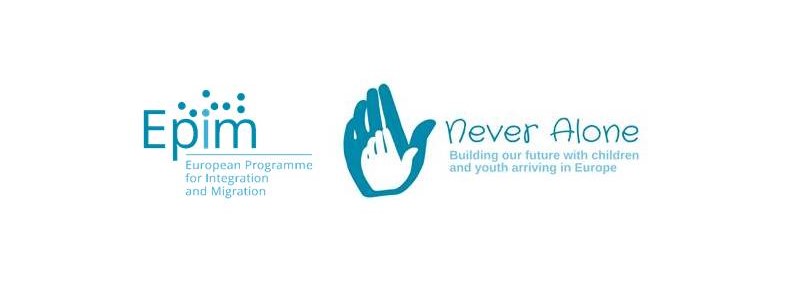
Interview: European Programme for Integration and Migration (EPIM)
Ms Fanny Georges, Programme Officer at EPIM answers our questions concerning the “Never Alone – Building our future with children and youth arriving in Europe” Fund.
1. A few words about European Programme for Integration and Migration
The European Programme for Integration and Migration (EPIM), established in 2005, is a collaborative funding initiative of 25 private foundations, hosted in the Network of European Foundations (NEF). The goal of EPIM is to strengthen the role of civil society in building inclusive communities and in developing humane and sustainable responses to migration, based on Europe’s commitment to universal human rights and social justice. To do this, EPIM’s support includes grant-making in several thematic areas, capacity development, knowledge support and connecting actors.
2. What is the “Never Alone – Building our future with children and youth arriving in Europe” Fund?
Starting from 2015, a number of European Foundations decided to invest in children arriving in Europe to set the right steps for their future and the future of the society they are part of. To achieve this, they established a specific Fund on this thematic within EPIM, called the “Never Alone – Building our future with children and youth arriving in Europe” Fund.
Since then, EPIM has been supporting civil society organisations across Europe to strengthen quality alternative care models for children and youth on the move, in the areas of child-supportive reception and support for youth in the transition to autonomy and adulthood. By linking this work and connecting stakeholders across Europe, EPIM supports efforts towards a comprehensive policy framework for children in migration in Europe.
3. Has the Fund supported work with children in Greece?
In 2016-2018, together with the Stavros Niarchos Foundation, the John S. Latsis Public Benefit Foundation and the Bodossaki Foundation, EPIM supported civil society organisations in Greece working on the identification and protection of unaccompanied and separated children and youth.
In 2019-2021, in a collaborative effort with the John S. Latsis Public Benefit Foundation, EPIM aims to continue investing in Greece.
4. Can you tell us more about the call for proposals “A Future for Migrant Children and Youth in Greece” and who can apply?
The call for proposals “A Future for Migrant Children and Youth in Greece” aims to contribute to building strong child protection systems relying on quality alternative care approaches that foster the inclusion of children and youth on the move in Greece.
EPIM invites interested partnerships among civil society organisations to propose a project under this call for proposals which should aim at pursuing (at least one of) the following two objectives:
- Strengthen and scale quality alternative care models that offer individualised, holistic, participatory and community-based support to children and youth. Through this, EPIM seeks to establish good practice, evidence gathering, and solution-based advocacy contributing to end institutionalisation and detention of children and youth.
- Supporting youth in the transition to autonomy and adulthood with a focus on access to formal education, vocational training, and/or the labour market.
EPIM will support (a) project(s) for two years (2019-2021) with a maximum budget of 160,000 EUR. The deadline to apply is 13 May (noon GMT +2). The lead applicant has to be a registered charity or non-profit organisation in Greece.
More information on eligibility and selection criteria and on how to apply can be found on the EPIM website.
5. When will the selection process be completed?
Final decision on grants will be made by 12 July, for projects to start in August/September 2019.
6. Additional to this funding, in which ways will EPIM support grantee organisations?
Additional to this call for proposals, EPIM will provide support to civil society organisations in Greece through:
- dedicated capacity development interventions, including trainings and learning grants, identifying and addressing capacity development needs and interests of grantee organisation(s) and other actors;
- exchange opportunities and knowledge support to organisations on topics of relevance; and
- Pan-European exchanges opportunities, such as conferences and learning grants, with the aim to connect actors across various countries who work on similar issues to share good practices and develop recommendations.

